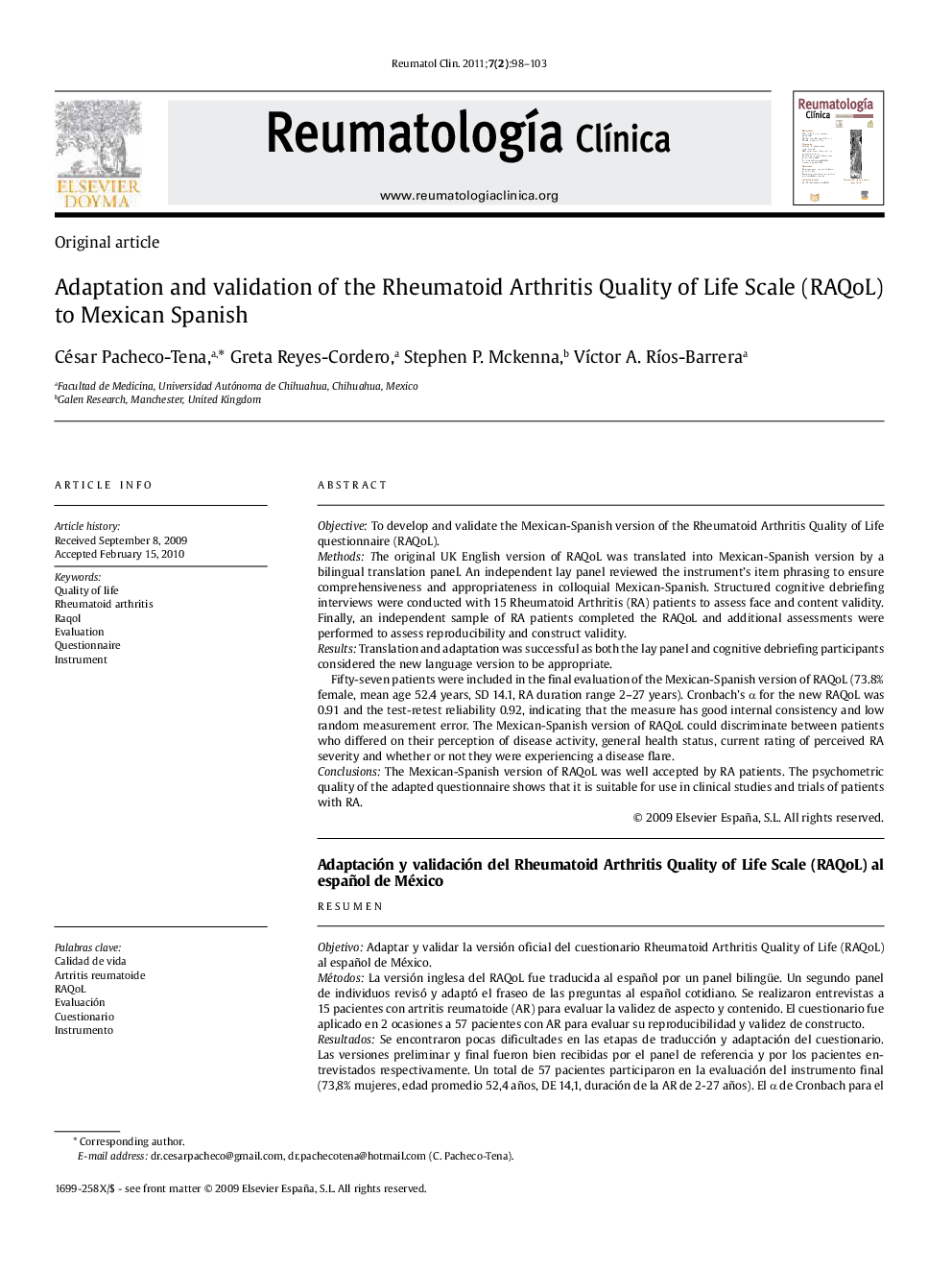| Article ID | Journal | Published Year | Pages | File Type |
|---|---|---|---|---|
| 3384687 | Reumatología Clínica (English Edition) | 2011 | 6 Pages |
ObjectiveTo develop and validate the Mexican-Spanish version of the Rheumatoid Arthritis Quality of Life questionnaire (RAQoL).MethodsThe original UK English version of RAQoL was translated into Mexican-Spanish version by a bilingual translation panel. An independent lay panel reviewed the instrument's item phrasing to ensure comprehensiveness and appropriateness in colloquial Mexican-Spanish. Structured cognitive debriefing interviews were conducted with 15 Rheumatoid Arthritis (RA) patients to assess face and content validity. Finally, an independent sample of RA patients completed the RAQoL and additional assessments were performed to assess reproducibility and construct validity.ResultsTranslation and adaptation was successful as both the lay panel and cognitive debriefing participants considered the new language version to be appropriate.Fifty-seven patients were included in the final evaluation of the Mexican-Spanish version of RAQoL (73.8% female, mean age 52.4 years, SD 14.1, RA duration range 2–27 years). Cronbach's αfor the new RAQoL was 0.91 and the test-retest reliability 0.92, indicating that the measure has good internal consistency and low random measurement error. The Mexican-Spanish version of RAQoL could discriminate between patients who differed on their perception of disease activity, general health status, current rating of perceived RA severity and whether or not they were experiencing a disease flare.ConclusionsThe Mexican-Spanish version of RAQoL was well accepted by RA patients. The psychometric quality of the adapted questionnaire shows that it is suitable for use in clinical studies and trials of patients with RA.
ResumenObjetivoAdaptar y validar la versión oficial del cuestionario Rheumatoid Arthritis Quality of Life (RAQoL) al español de México.MétodosLa versión inglesa del RAQoL fue traducida al español por un panel bilingüe. Un segundo panel de individuos revisó y adaptó el fraseo de las preguntas al español cotidiano. Se realizaron entrevistas a 15 pacientes con artritis reumatoide (AR) para evaluar la validez de aspecto y contenido. El cuestionario fue aplicado en 2 ocasiones a 57 pacientes con AR para evaluar su reproducibilidad y validez de constructo.ResultadosSe encontraron pocas dificultades en las etapas de traducción y adaptación del cuestionario. Las versiones preliminar y final fueron bien recibidas por el panel de referencia y por los pacientes entrevistados respectivamente. Un total de 57 pacientes participaron en la evaluación del instrumento final (73,8% mujeres, edad promedio 52,4 años, DE 14,1, duración de la AR de 2-27 años). El αde Cronbach para el RAQoL en español de México fue de 0,91 y la fiabilidad aplicación-reaplicación de 0,92, lo que sugiere que el cuestionario muestra interrelación homogénea entre sus componentes y que tiene niveles bajos de errores aleatorios de medición. El RAQoL en español de México pudo discernir a pacientes que difirieron en relación con la percepción de la severidad de su enfermedad, estado general de salud, calificación de su enfermedad el mismo día y si cursaban o no con una recaída al momento de la evaluación.ConclusionesEl RAQoL en español de México fue bien recibido por pacientes con AR. La calidad del cuestionario adaptado lo muestra como un instrumento útil para ensayos clínicos de pacientes con AR.
